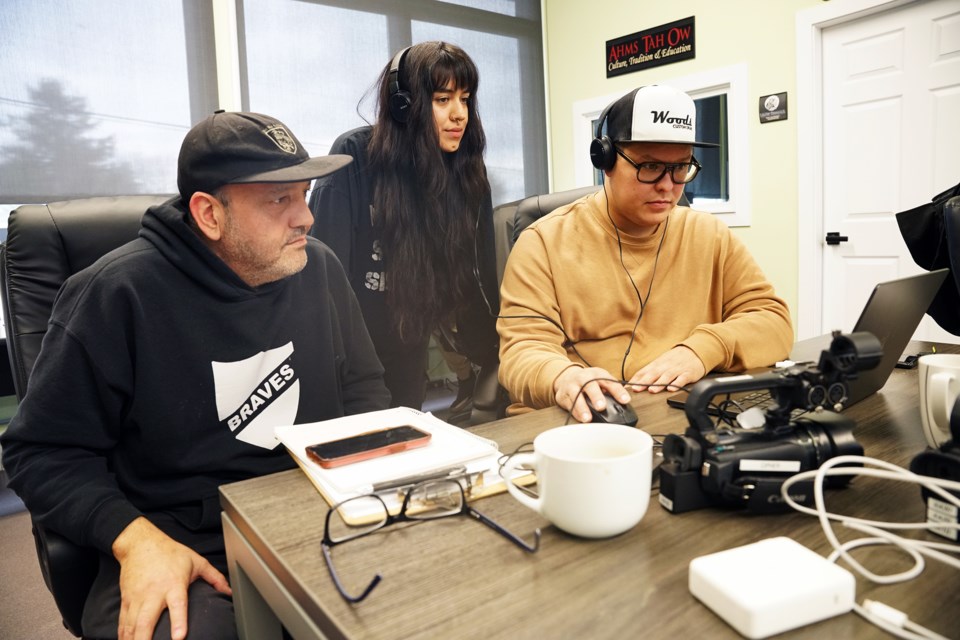qathet Film Collective is teaching a group of students from Tla’amin Nation to become proficient in the digital film medium.
David Allen Moon, one of the students, has been an Indigenous live-streamer since 2018 and conducts research covering stories.
“I want to enhance my digital skills in multimedia and this course is ideal for that,” said Moon. “I’m learning video editing and how to use cameras, I’m learning to edit sound, videos and I’m learning different techniques on how to use equipment such as lighting. There’s lots of stuff I’m learning in this six-week course.”
He said as a streamer, he is self-taught, and has become aware of how to use different types of technology, but coming to this course, it is filling gaps.
Moon said he is making a short film and has other students assisting him. The production will tell a story about his stepbrother, who Moon said was killed in 1993 by the Vancouver city police.
“It’s basically a message to demand justice and accountability to all government agencies,” said Moon.
He said he is “100 per cent” enjoying the course and it will hopefully help him to become an Indigenous journalist in the future.
Baby Harry, another student, said she wants to create films, documentaries, interviews and reels for social media, but her main focus is to spread the knowledge of Tla’amin culture and keep it alive.
“I can record stories that I have been told by elders and my parents and be able to share with my children, their children and anyone who wants to gain the knowledge,” said Harry. “I’m fairly new to video. I mostly did still photography before but I wanted to expand to videography to help spread knowledge even more.”
Harry said she has found the course to be “really fun.”
She said Tla’amin has purchased video equipment that students can sign out and use to tell their stories and that anyone can gain something from the knowledge presented.
“Our culture has been stripped from us and a lot of us are still getting it back,” said Harry. “I’d like to be part of that. Hopefully, we can have our language and culture thrive again.”
Harry said she is working on a little documentary about her mom and her knowledge of plant medicines and traditional food.
Story list
Brianne Louie said she was appointed to the class to assist her in her work for Tla’amin as a language and culture coordinator.
“From my understanding, after I’ve done this course, we’re going to be doing a bunch of short films for the community,” said Louie. “I’m really excited that I’ve gotten into this class.”
Louie said she has always been interested in digital media so it will be nice to be able to work in that field. She said she did digital media in grade 12, so there has been a gap between that and her latest course.
Louie said her focus in the course has been on camera work, so she is doing a lot of filming, as well as learning about lighting and editing. She said she has a list of stories to work on for Tla’amin after the course; a minimum of five films need to be done.
“I’m super-excited to be learning about digital media,” said Louie. “I really enjoy the course. I’m definitely learning a lot, which I really appreciate.”
Skill sets
Tla’amin director of education Sophie Call said this program is a great opportunity because it provides the chance for members to develop a skill set, and will also help Tla’amin broadly.
“There is an ongoing interest in capturing stories and events on film,” said Call.
She said two of the students in the course, newly employed in the language and culture department of Tla’amin Nation, will be working to develop some local history videos.
Call said a grant was allocated by the provincial ministry of post-secondary education and future skills to operate the course and purchase equipment. The students wll ibe putting on a gala for Tla’amin on December 14 and starting December 15, the work will be shown at qathet Art Centre.
“It’s such an important medium,” said Call. “To be the owners and sharers of those stories with folks outside of the community is part of developing ongoing, positive relationships with the broader community. Huge opportunities await.”
qathet Film Collective mentor Tony Papa said there are seven students enrolled in the six-week course, with varying levels of skills. Papa said some students had previously taken the Powell River Digital Film School course he teaches annually at Brooks Secondary School, and some are novices.
“What’s really cool is they are working collaboratively, helping each other,” said Papa. “Some have gravitated to camera work or sound design and get excited about that. I love that.”
Papa said part of the proposal to put on the course was to tell stories that are traditional and integrate components, such as promoting Tla’amin language. He said following the conclusion of the course, Tla’amin will have a cadre of people skilled in filmmaking, rather than having to go outside its borders to hire people to help tell the stories.
“They can do it themselves and I’m proud of that,” said Papa.
He added that he is impressed with the quality of the work the students are producing and how they are catching onto something that can sometimes take a long time for people to become proficient. He said the students will have the ability at the conclusion of the course to proficiently document important features of Tla’amin Nation.
“There are some very beautiful First Nations stories,” said Papa. “We want to elevate that and have it more prevalent.”
Join the Peak's email list for the top headlines right in your inbox Monday to Friday.


